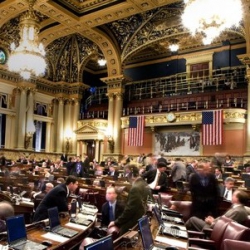Northampton County District Attorney John Morganelli wrote an 8-page memo to the Pennsylvania District Attorneys Association, call for them to take an official stance against online gambling. Morganelli claims legalized, licensed, and regulated online gambling would lead to more gambling addiction, more crime, a spate of bankruptcies, more poverty across the state, and even suicides.
The district attorney for the county surrounding Allentown and Bethlehem made those opinions known in his letter, which painted a bleak picture of Pennsylvania if it legalized online casino and poker sites. The longtime district attorney said “we are letting loose a second lion in the pasture.”
The official stated in his 8-page letter to the Pennsylvania DAA, “It is the remote nature of this type of gaming that makes it such a threat to public health. The accessibility it offers allows people to gamble wherever and whenever, including at work and school.”
Morganelli added, “For addicts, the temptation is setting right there, in their phone, their computer, at their desk.”
About Northampton County Casinos
John Morganelli is the district attorney in the county where casino mogul Sheldon Adelson has his biggest casino operation on the east coast. The Sands Bethlehem is the largest land-based casino in Pennsylvania.
Under terms of the proposed new law, the Sands Bethlehem would be one of the gaming venues likely to have the opportunity to gain licensing for online casino. Sheldon Adelson likely would forgo the opportunity, because it would undermine his argument that online gambling is dangerous.
Sheldon Adelson’s Gaming Revenues
No one in the history of the world has made more money off of gamblers, yet Sheldon Adelson claims he wants to protect at-risk gamblers from the ravages of gambling addiction. Adelson and his proponents argue that gaming through a smartphone is much more dangerous than land-based gaming, because it is so convenient. They also doubt publicly whether geolocation software can pinpoint a gambler inside a single state, ignoring the commonplace and much-trusted nature of GPS technology.
The irony in Morganelli’s letter is he refers to a “second lion in the pasture”.
That implies there is a “first lion”, which in the context of Morganelli’s words would have to be brick-and-mortar casinos. Given his proximity to the Sands Bethlehem and his writing from seeming experience in dealing with heightened crime rates due to gambling, Morganelli seems to take for granted that the Sands Bethlehem is a scourge on society.
John Payne’s Online Gambling Bill
Morganelli’s letter was written in response to news this week that an online gambling bill was passed in a key committee in the Pennsylvania House of Representatives. The bill, which is sponsored by Rep. John Payne, is expected to see a vote in the House in June.
If the bill passes in the House, then the Pennsylvania State Senate would vote on the proposed law. If HB 540 passed in the Senate, then it would go to Gov. Tom Wolf for his signature.
A Reply to John Morganelli
Proponents of regulated online gambling would argue that everything John Morganelli warns about is already in-effect. Opponents of John Payne’s bill act as if no illegal online gambling takes place at the moment. In fact, Pennsylvanians wager hundreds of millions of dollars each year on unregulated offshore online gambling websites.
Concerns about gambling addiction and the various ills which come with it — bankruptcy, desperation, poverty, crime, despair, and suicide — already affect Pennsylvanians. In fact, given the unregulated nature of online gambling in Pennsylvania right now, those residents have absolutely no official protection and no official resources to help them deal with their compulsions.
How Regulated Online Gambling Works
In a regulated gaming environment, the state imposes standards by which licensed operators accept play. This means they would implement a self-exclusion list, funds for gambling addiction help hotlines and professionals, and a “panic button” for those in need. These have proven effective in other jurisdictions. John Morganelli’s way would leave gamblers prey to anonymous offshore operators with no accountability, while barring legitimate businesses which already operate in Pennsylvania from getting into the business.
Unlicensed online gambling sites likely would continue to exist if John Payne’s bill were passed. The difference is Pennsylvania gamblers would have legitimate, trustworthy alternatives to dealing with offshore operators. Gambling addicts are going to gamble, no matter what the law saws. The best that can be done for them is to provide a safe, regulated environment which encourages them to get help.
That simply is not going to happen, if John Morganelli has his way.

